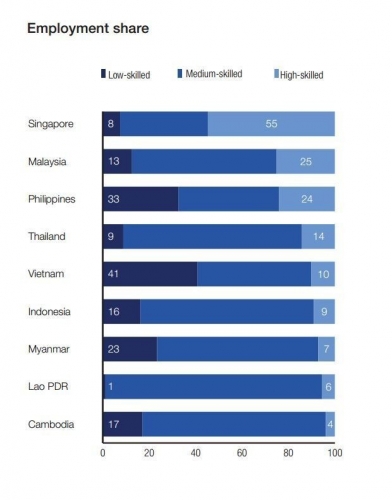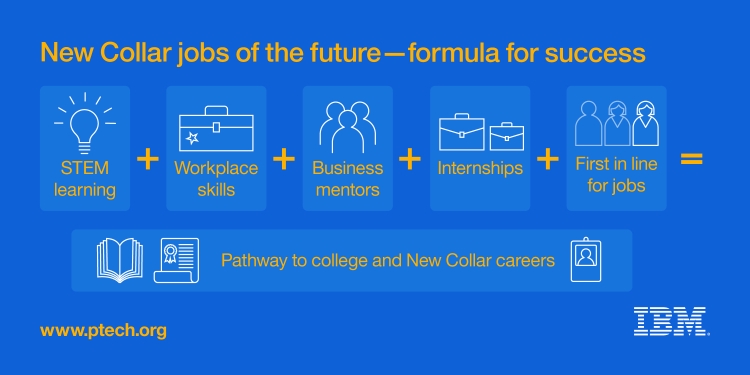Developing Tomorrow’s Resilient Workforce Today
Some see it as a plague while others as an opportunity—either way, the Fourth Industrial Revolution will impact all industries, economies, and society at large. Also known as Industry 4.0, this revolution is marked by “a fusion of technologies that is blurring the lines between the physical, digital, and biological spheres.” Unlike previous industrial transformations, 4.0 is happening at a higher speed, indiscriminately disrupts across industries and economies, and will likely reconstruct entire systems. How will companies adapt to this accelerated rate of technological change? How will business ensure they can access the right talent in an ever-evolving landscape of skills?
Given the magnitude of this impending change, the Fourth Industrial Revolution took center stage at the recent Davos Summit. Global leaders from the private and public sector highlighted various noteworthy contextual barriers and potential solutions that companies should be aware of.

Source: World Economic Forum, 2016
The future of work and digitization are key issues in Asia too. It has emerged as a new topic in the ELEVATE report Tracking the Trends 2019 – Volume 1. In the Asian context, a widening skills gap is becoming a growing challenge. Low-skilled, affordable labor historically propelled companies in the region, however, Asian businesses are increasingly depending on higher-skilled labor instead. Such high-skilled workers are difficult to find in most Asian countries. Though country level differences exist, there are various underlying commonalities exacerbating the skills gap issue in the region:
- Students in higher education are studying topics that are less relevant instead of critical STEM subjects.
- Teachers are not properly trained to teach STEM.
- An estimated 65% of the children entering primary schools are going to work in a job that currently does not exist, which makes curriculum development problematic.
- There are educational and workforce participation barriers to women and girls. These persistent gaps are determinants of higher youth workforce inactivity rates with some of the highest levels in south and east Asia. Malaysia (41%), followed by Indonesia (38%) and the Philippines (35%) are experiencing the highest workforce participation gender gap in Asia.
- Investing in early education is not a government priority and students that fall behind at this early stage, typically from poor and vulnerable backgrounds, are unable to catch up.
These challenges ripple through educational systems and governments to eventually funnel unskilled workers into a company’s talent pool. Consequently, many companies must rely on outsourcing to foreigners. Such short-term approaches can temporarily bridge the gap, but to be a sustainable company requires developing a strategy to successfully adapt to Industry 4.0.
P-TECH Launches in ASEAN
IBM scaled its Pathways in Technology Early College High-Schools (P-TECH) program to ASEAN in 2018. P-TECH is IBM’s proactive response to the global skills shortage. The program exposes students to jobs in information and communications technology (ICT) and other science, technology, engineering, and mathematics (STEM) disciples through internships and mentorships. Industry leaders that partner with IBM also offer P-TECH graduates ‘first in line’ job opportunities.

Source: IBM, 2017
Part of the success of the P-TECH model is its focus on partnerships. By partnering with public schools and colleges, other companies and with government, IBM is enhancing the education system by promoting transformation in a long-term manner. This contrasts against one-off, short-term projects with non-profits.
As of mid-2019, 18 countries have announced the intent to open P-TECHs, or have already opened P-TECHs. Countries with P-TECHs in operation include Singapore, South Korea, Taiwan, Australia, the US, and Morocco. Additional countries include Argentina, Brazil, New Zealand, Italy, Canada, Czech Republic, France, Ireland, UK, Egypt, Philippines and Colombia. By end-2019, the total number of P-TECHs in operation will be 200.
CSR Asia Summit 2019: A Closer Look at the Future
This September 19 in Bangkok, IBM Asia Pacific will speak at CSR Asia Summit 2019 to share learnings from their public-private-partnership. The Developing Tomorrow’s Resilient Workforce Today panel will explore how companies and governments are adapting and anticipating the manner which the Fourth Industrial Revolution is changing the nature of work across industries and economies. UNESCO Bangkok and Multiverz will contribute governmental perspectives to this interactive dialogue while leveraging case studies from India, Singapore, and Thailand.
While technological-driven change is displacing jobs and threatening to exacerbate global inequalities by creating a tech divide, this panel will highlight how disruption is simultaneously creating economic and social opportunities. We look forward to having you participate in this important dialogue and welcoming you to our 13th annual CSR Asia Summit.
Contact us to learn more
These blogs are written by ELEVATE staff members or associates and the views and opinions expressed are not necessarily those of ELEVATE.
About the author
